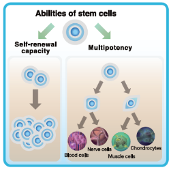- HOME>
- Applicable diseases OA, RA, Chronic Pain
Treatment of osteoarthritis, rheumatoid arthritis, and persistent neurological symptoms resulting from cervical and lumbar spine disorders, using Adipose-derived Stem cells
The goal of regenerative medicine is to improve the quality of life, as well as diseases and injuries that cannot be cured by modern Western medicine.
What is regenerative medicine (stem cell therapy)?
 Human beings have an innate ability to repair. Stem cells play an important role in the tissue regeneration process. ”Stem cells” are a group of cells that have the ability to multiply infinitely on their own (self-renewal ability) and the ability to differentiate = transform into specific tissues (pluripotency).
Human beings have an innate ability to repair. Stem cells play an important role in the tissue regeneration process. ”Stem cells” are a group of cells that have the ability to multiply infinitely on their own (self-renewal ability) and the ability to differentiate = transform into specific tissues (pluripotency).
By fully understanding and utilizing the abilities and characteristics of these cells, we can treat injuries and diseases by drawing out the self-renewal ability of biological tissues and restoring organ function. In the near future, it is expected that these stem cells will be used in a variety of ways.
Among stem cells, adipose tissue-derived stem cells, which are hidden in the subcutaneous tissue, which are easy to extract and have a large number, have recently attracted attention.
All regenerative medicine provided by Sobajima Clinic has passed the examination by the Specially Certified Regenerative Medicine Committee, and a notification regarding the “Regenerative Medicine Provision Plan” has been submitted to the Ministry of Health, Labour and Welfare and accepted.
The special effects of adipose-derived stem cells
❖ Anti-inflammatory effect ❖ Angiogenic effect ❖ Antifibrotic effect ❖ Ability to release growth hormones ❖ Ability to differentiate cells, etc ❖ Ability of homing
Cell-based therapies including fresh stem cells treatments and cultured stem cells treatments
We offer various cell-based therapies including fresh stem cells treatments, cultured stem cells treatments, and a cell bank service.
Applicable Diseases
■These new treatments are applicable to a range of diseases, including chronic orthopedic diseases such as osteoarthritis, rheumatoid arthritis (difficult to treat), and persistent neurological symptoms resulting from cervical and lumbar spine disorders that is designed to address conditions where traditional therapies have been insufficient.
■This treatment is pursued in cases where standard therapies have limited effectiveness, to avoid surgery, or to alleviate symptoms that persist after surgery.
■These treatments are believed to suppress inflammation and promote tissue repair, thereby preserving the body’s homeostasis as much as possible and delaying the degeneration of tissues
Adipose Stem Cell Bank Services
This is a service that preserves adipose stem cells for future treatment needs.
What is the Stem Cell Bank Service?
Human beings have an innate ability to repair. Stem cells play an important role in the tissue regeneration process. Among stem cells, adipose tissue-derived stem cells, which are hidden in the subcutaneous tissue, which are easy to extract and have a large number, have recently attracted attention. We provide treatment for many patients, including osteoarthritis, and the target diseases are expanding. Stem cells are currently used in a variety of diseases, pathophysiology, and preventive medicine, and are expected to be used in a variety of ways in the near future. However, while diseases and injuries at a young age are easily cured, diseases and injuries become harder to heal with age due to aging and a decrease in the number of stem cells.
The “Adipose Stem Cell Bank Service” provided by Medipreneur Co., Ltd., which is linked to Sobajima Clinic, collects healthy cells when they are young and healthy, freezes them, and makes them available when they are needed in the future (such as when they are sick or injured).
How to use the adipose stem cell bank
After giving a sufficient explanation and understanding, the subcutaneous fat (from the thighs, buttocks, etc.) of the person.Suction to be drawn. After that, the aspirated subcutaneous fat is collected by specialized staff at the “Cell Processing Center” set up in the facility, and stored for a long time in ultra-low temperature storage (minus 150 degrees Celsius or less). When treatment is necessary, it is thawed and administered to cells.
■Subcutaneous liposuction The patient’s own subcutaneous fat (usually buttocks and thighs) is sucked in a short time. A small amount of fat (about 10~20g) is sucked. Anesthesia is basically local anesthesia, and fat is collected safely and efficiently.
■Stem cell isolation Isolate adipose stem cells from the aspirated fat. Stem cells are separated while sterilization operations are performed, and concentrated stem cells are purified.
■Adipose Stem Cell Preservation The cells obtained by culturing are divided into several cells and stored. By dividing it into severaldoses, it will be possible to use your own adipose stem cells for various treatments in multiple doses in the future and receive regenerative medicine. (* A separate fee will be charged at the time of culture.) )
Bridging the Gap: The Joint Effort of Clinic and Universities in Advancing Patient Care
PubMed Search
Tsubosaka M, Matsumoto T, Sobajima S, Matsushita T, Iwaguro H, Kuroda R.BMC Musculoskelet Disord. 2020 Apr 6;21(1):207. doi: 10.1186/s12891-020-03231-3.PMID: 32252731
Onoi Y, Matsumoto T, Sobajima S, Tsubosaka M, Hayashi S, Matsushita T, Iwaguro H, Kuroda R.Regen Ther. 2023 Jun 15;24:94-102. doi: 10.1016/j.reth.2023.06.006. eCollection 2023 Dec.PMID: 37363753
Tsubosaka M, Matsumoto T, Sobajima S, Matsushita T, Iwaguro H, Kuroda R.Cell Transplant. 2021 Jan-Dec;30:9636897211067454. doi: 10.1177/09636897211067454.PMID: 35392685
Yotsumoto F, Iwaguro H, Harada Y, Sobajima S, Suwabe T, Miyamoto S.Regen Med. 2020 Jul;15(7):1891-1904. doi: 10.2217/rme-2020-0037. Epub 2020 Jul 23.PMID: 32698666
Fujita M, Matsumoto T, Hayashi S, Hashimoto S, Nakano N, Maeda T, Kuroda Y, Takashima Y, Kikuchi K, Anjiki K, Ikuta K, Onoi Y, Tachibana S, Matsushita T, Iwaguro H, Sobajima S, Hiranaka T, Kuroda R.J Cell Physiol. 2022 Sep;237(9):3627-3639. doi: 10.1002/jcp.30823. Epub 2022 Jun 29.PMID: 35766589
Kawai S, Sobajima S, Jinnouchi M, Nakano H, Ohtani H, Sakata M, Adachi T.Clin Drug Investig. 2022 May;42(5):403-416. doi: 10.1007/s40261-022-01139-5. Epub 2022 Apr 18.PMID: 35435639 Clinical Trial.
Kamada K, Matsushita T, Yamashita T, Matsumoto T, Iwaguro H, Sobajima S, Kuroda R.J Clin Med. 2021 Sep 22;10(19):4309. doi: 10.3390/jcm10194309.PMID: 34640324
Fujita M, Matsumoto T, Sobajima S, Tsubosaka M, Matsushita T, Iwaguro H, Kuroda R.Cell Transplant. 2023 Jan-Dec;32:9636897231190175. doi: 10.1177/09636897231190175.PMID: 37551027 Clinical Trial.
Feasibility of a stem cell therapy for intervertebral disc degeneration.
Sobajima S, Vadala G, Shimer A, Kim JS, Gilbertson LG, Kang JD.Spine J. 2008 Nov-Dec;8(6):888-96. doi: 10.1016/j.spinee.2007.09.011. Epub 2007 Dec 21.PMID: 18082460
In vitro interaction between muscle-derived stem cells and nucleus pulposus cells.
Vadalà G, Sobajima S, Lee JY, Huard J, Denaro V, Kang JD, Gilbertson LG.Spine J. 2008 Sep-Oct;8(5):804-9. doi: 10.1016/j.spinee.2007.07.394. Epub 2007 Nov 26.PMID: 18023623




